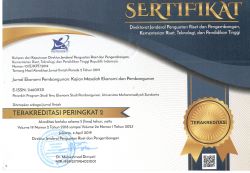CO2 Emissions and Subjective Well-Being: Empirical Evidence from The Southeast Asian Population
Moh. Wahyudi Priyanto(1*), Dian Eswin Wijayanti(2), Yahya Shafiyuddin Hilmi(3)(1) Department of Agribusiness, Universitas Trunojoyo Madura, Bangkalan
(2) Department of Agribusiness, Universitas Trunojoyo Madura, Bangkalan
(3) Doctoral School of Economics and Regional Science, Hungarian University of Agriculture and Life Sciences, Gödöllő
(*) Corresponding Author
Abstract
An increasing amount of carbon dioxide (CO2) affects the planet and people. As a primary contributor to climate change, CO2 has been a subject of discussion among researchers. Many have been studying the complex relationship and impact of CO2. However, a study examining the influence of increased CO2 emissions on human subjective well-being is limited. This study aims to fill the gap by utilizing a sample of 9,724 Southeast Asians from the Seventh World Values Survey (2017-2021). Well-being is measured using a subjective approach, such as happiness and life satisfaction. The ordered probit regression analysis indicates that increased per capita CO2 emissions decrease happiness and life satisfaction. Additionally, the higher individuals' financial and health levels, the higher their relationship with their happiness and life satisfaction will be. This study encourages further research investigating a specific country's relationship between CO2 emissions and the well-being of its population.
Keywords
Full Text:
PDFReferences
Adger, W. N., & Winkels, A. (2018). Vulnerability, poverty, and sustaining well- being. In Edward Elgar Publishing.
Ahlburg, D. A. (1996). Population growth and poverty. In The impact of population growth on well-being in developing countries (pp. 219–258). Springer.
Anderson, C., Kraus, M. W., & Galinsky, A. D. (2012). The Local-Ladder Effect : Social Status and Subjective Well-Being. Psychological Science, 23(7), 764–771. https://doi.org/10.1177/0956797611434537
Ansari, M. A., Haider, S., & Khan, N. A. (2020). Does trade openness affects global carbon dioxide emissions: evidence from the top CO2 emitters. Management of Environmental Quality: An International Journal, 31(1), 32–53.
Apergis, N., & Majeed, M. T. (2021). Greenhouse gas emissions and cross-national happiness: a global perspective. Air Quality, Atmosphere & Health, 14(8), 1289–1300.
ASEAN. (2008). The Asean Charter. ASEAN Secretariat. https://asean.org/wp-content/uploads/images/archive/publications/ASEAN-Charter.pdf
Bai, J., Mo, K., Peng, Y., Hao, W., Qu, Y., Lei, X., & Yang, Y. (2021). The Relationship Between the Use of Mobile Social Media and Subjective Well-Being: The Mediating Effect of Boredom Proneness. Frontiers in Psychology, 11(January), 1–10. https://doi.org/10.3389/fpsyg.2020.568492
Baker, W. E. (2013). America’s crisis of values: Reality and perception. Princeton University Press.
Barbier, E. B. (2014). Climate change mitigation policies and poverty. Wiley Interdisciplinary Reviews: Climate Change, 5(4), 483–491. https://doi.org/10.1002/wcc.281
Brailovskaia, J., Lin, M., Scholten, S., Zhu, M., & Fu, Y. (2022). A Qualitative Cross ‑ Cultural Comparison of Well ‑ Being Constructs : the Meaning of Happiness , Life Satisfaction , and Social Support for German and Chinese Students. Journal of Happiness Studies, 23(4), 1379–1402. https://doi.org/10.1007/s10902-021-00454-6
Brown, S., & Gray, D. (2016). Household finances and well-being in Australia: An empirical analysis of comparison effects. Journal of Economic Psychology, 53(8530), 17–36. https://doi.org/10.1016/j.joep.2015.12.006
Bruin, J. (2011). newtest: command to compute new test {@ONLINE}. https://stats.oarc.ucla.edu/stata/ado/analysis/
Chadi, A., & Hoffmann, M. (2021). Television, Health, and Happiness: A Natural Experiment in West Germany. SSRN Electronic Journal, 14721. https://doi.org/10.2139/ssrn.3921511
Chen, Y., Wang, Z., & Zhong, Z. (2019). CO2 emissions, economic growth, renewable and non-renewable energy production and foreign trade in China. Renewable Energy, 131, 208–216.
Cloutier, S., Angilletta, M., Mathias, J.-D., & Onat, N. C. (2020). Informing the sustainable pursuit of happiness. Sustainability, 12(22), 9491.
Diener, E., Oishi, S., & Tay, L. (2018). Advances in subjective well-being research. Nature Human Behaviour, 2(4), 253–260. https://doi.org/10.1038/s41562-018-0307-6
Diener, E., & Tay, L. (2013). Rising Income and the Subjective Well-Being of Nations. 104(2), 267–276. https://doi.org/10.1037/a0030487
Ferdous, J. (2021). COVID-19 in South and South East Asia. Southeast Asia: A Multidisciplinary Journal, 21(2), 83–94.
Greene, W. H. (2018). Econometric Analysis. Pearson. https://books.google.co.id/books?id=xGZRvgAACAAJ
Kohler, H. P. (2015). Do children bring happiness and purpose in life? Whither the Child?: Causes and Consequences of Low Fertility, 2005, 47–76. https://doi.org/10.4324/9781315631134
Kumar, A., Singh, P., Raizada, P., & Hussain, C. M. (2022). Impact of COVID-19 on greenhouse gases emissions: A critical review. Science of the Total Environment, 806, 150349. https://doi.org/10.1016/j.scitotenv.2021.150349
Kumari, N., Kumar, P., & Sahu, N. C. (2021). Do energy consumption and environmental quality enhance subjective wellbeing in G20 countries? Environmental Science and Pollution Research, 28(42), 60246–60267.
Laborde, D., Martin, W., & Vos, R. (2020). Impacts of COVID-19 on global poverty, food security and diets. Agricultural Economics, 52(3), 375–390.
Lane, J.-E. (2011). CO2 emissions and GDP. International Journal of Social Economics, 38(11), 911–918.
Li, B., & Haneklaus, N. (2021). The role of renewable energy, fossil fuel consumption, urbanization and economic growth on CO2 emissions in China. Energy Reports, 7, 783–791. https://doi.org/https://doi.org/10.1016/j.egyr.2021.09.194
Lu, F., & Sohail, M. T. (2022). Exploring the effects of natural capital depletion and natural disasters on happiness and human wellbeing: a study in China. Frontiers in Psychology, 13, 870623.
Mei, B., Yue, H., Zheng, X., McDowell, W. H., Zhao, Q., Zhou, Z., & Yao, Z. (2018). Effects of grazing pattern on ecosystem respiration and methane flux in a sown pasture in Inner Mongolia, China. Atmosphere, 10(1). https://doi.org/10.3390/atmos10010005
Meisenberg, G., & Woodley, M. A. (2015). Gender Differences in Subjective Well-Being and Their Relationships with Gender Equality. Journal of Happiness Studies, 16(6), 1539–1555. https://doi.org/10.1007/s10902-014-9577-5
Mohammed, S., Rashid, A., Alsafadi, K., Hijazi, O., Kumar, K., Abul, M., Husain, A., Islam, S., Marina, M., Cabral-pinto, S., & Harsanyi, E. (2021). An overview of greenhouse gases emissions in Hungary. Journal of Cleaner Production, 314, 127865. https://doi.org/10.1016/j.jclepro.2021.127865
Morgan, P. J., & Trinh, L. Q. (2021). Households in Asean Countries: Asian Development Bank Institute (Issue 1226).
Ngoo, Y. T., Tey, N. P., & Tan, E. C. (2015). Determinants of Life Satisfaction in Asia. Social Indicators Research, 124(1), 141–156. https://doi.org/10.1007/s11205-014-0772-x
Nugroho, T. W., Hanani, N., Toiba, H., & Sujarwo, S. (2022). Promoting Subjective Well‐Being among Rural and Urban Residents in Indonesia: Does Social Capital Matter? Sustainability (Switzerland), 14(4). https://doi.org/10.3390/su14042375
Nwakuya, M. T., & Mmaduka, O. (2019). Ordered logistic regression on the mental health of undergraduate students. International Journal of Probability and Statistics, 8(1), 14–18.
Priyanto, M. W. (2021). Pengaruh perubahan iklim terhadap produk domestik regional bruto sektor pertanian. Agritech: Jurnal Fakultas Pertanian Universitas Muhammadiyah Purwokerto, 23(2), 91–98. https://doi.org/http://dx.doi.org/10.30595/agritech.v23i2.8879
Rahman, M. S., Andriatmoko, N. D., Saeri, M., Subagio, H., Malik, A., Triastono, J., Oelviani, R., Kilmanun, J. C., Silva, H. da, Pesireron, M., Senewe, R. E., & Yusuf, Y. (2022). Climate Disasters and Subjective Well-Being among Urban and Rural Residents in Indonesia. Sustainability (Switzerland), 14(6), 1–14. https://doi.org/10.3390/su14063383
Ritchie, H., Roser, M., & Rosado, P. (2020). CO₂ and Greenhouse Gas Emissions. https://ourworldindata.org/co2-and-greenhouse-gas-emissions
Salahuddin, M., Alam, K., Ozturk, I., & Sohag, K. (2018). The effects of electricity consumption, economic growth, financial development and foreign direct investment on CO2 emissions in Kuwait. Renewable and Sustainable Energy Reviews, 81, 2002–2010.
Sarmiento, L. (2022). Air pollution and the productivity of high-skill labor: evidence from court hearings. The Scandinavian Journal of Economics, 124(1), 301–332.
Shi, Z. (2016). Does the number of children matter to the happiness of their parents? Journal of Chinese Sociology, 3(1). https://doi.org/10.1186/s40711-016-0031-4
Sørensen, J. F. L. (2021). The rural happiness paradox in developed countries. Social Science Research, 98(March). https://doi.org/10.1016/j.ssresearch.2021.102581
Stenlund, S., Koivumaa‑Honkanen, H., Sillanmäki, L., Lagström, H., Rautava, P., & Suominen, S. (2022). Changed health behavior improves subjective well-being and vice versa in a follow-up of 9 years. Health and Quality of Life Outcomes, 20(66), 1–12.
Taghizadeh-Hesary, F., & Taghizadeh-Hesary, F. (2020). The impacts of air pollution on health and economy in Southeast Asia. Energies, 13(7), 1812.
Thomas, F., Sabel, C. E., Morton, K., Hiscock, R., & Depledge, M. H. (2014). Extended impacts of climate change on health and wellbeing. Environmental Science & Policy, 44, 271–278.
Wang, M., & Wong, M. C. S. (2014). Happiness and Leisure Across Countries: Evidence from International Survey Data. Journal of Happiness Studies, 15(1), 85–118. https://doi.org/10.1007/s10902-013-9417-z
Weijers, D., & Agar, N. (2023). Why we’re seduced by climate tech and what it means for our happiness. Frontiers in Climate, 5, 1193581.
Welsch, H. (2002). Preferences over prosperity and pollution: environmental valuation based on happiness surveys. Kyklos, 55(4), 473–494.
World Bank. (2024). Indicators: Electric power consumption (kWh per capita), Fossil fuel energy consumption (% of total), GDP per capita (current US$), Renewable electricity output (% of total electricity output), and Total population (million people). https://data.worldbank.org/indicator
World Values Survey, W. (2022). WVS Wave 7 (2017-2021). https://www.worldvaluessurvey.org/WVSDocumentationWV7.jsp
Worldbank. (2021). GDP per capita (current US$). Worldbank. https://data.worldbank.org/indicator/NY.GDP.PCAP.CD?view=chart
Yu, S., & Blader, S. L. (2020). Why Does Social Class Affect Subjective Well-Being? The Role of Status and Power. Personality and Social Psychology Bulletin, 46(3), 331–348. https://doi.org/10.1177/0146167219853841
Zhang, C., Zeng, G., Huang, D., Lai, C., Chen, M., Cheng, M., Tang, W., Tang, L., Dong, H., Huang, B., Tan, X., & Wang, R. (2019). Biochar for environmental management: Mitigating greenhouse gas emissions, contaminant treatment, and potential negative impacts. Chemical Engineering Journal, 373(January), 902–922. https://doi.org/10.1016/j.cej.2019.05.139
Zidanšek, A. (2007). Sustainable development and happiness in nations. Energy, 32(6), 891–897.
Zweig, J. S. (2015). Are Women Happier than Men? Evidence from the Gallup World Poll. Journal of Happiness Studies, 16(2), 515–541. https://doi.org/10.1007/s10902-014-9521-8
Article Metrics
Abstract view(s): 28 time(s)PDF: 6 time(s)
Refbacks
- There are currently no refbacks.
















